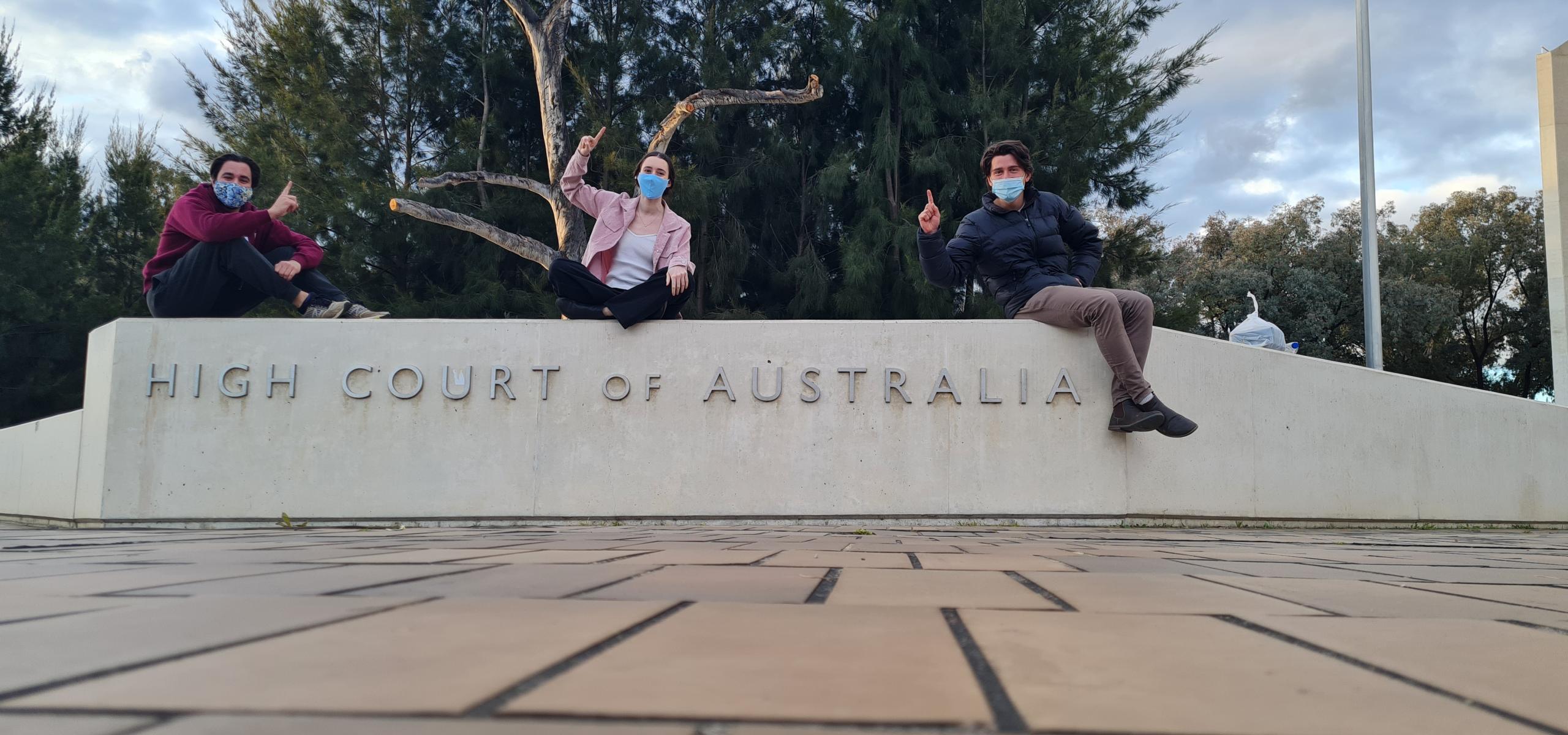
The winning ANU team members Tom Dunbabin, Madeleine McGregor, and Benjamin Durkin.
[Mooting] has been great throughout my whole law degree. It teaches you really good skills, how to think on your feet, and how to analyse legal problems that are new and don’t have much case law on them
By Aidan Hookey (student ambassador)
A team of law students from The Australian National University (ANU) has won the prestigious 2021 Sir Harry Gibbs Constitutional Law Moot.
Students Madeleine McGregor, Thomas Dunbabin and Benjamin Durkin competed against 19 teams of Australia’s top law students. After defeating the University of Queensland in the quarter-final and the University of Sydney in the semi-final, they faced the University of Melbourne in the final round.
For the first time in the history of the competition, judges were unable to split the two teams in the decider, crowning both the ANU and University of Melbourne teams as joint winners!
The judges included The Hon Justice Stephen Gageler QC AC (BEc '80, LLB, ’82, HonLLD '15) of the High Court of Australia as well as Justices Melissa Perry and Mark Moshinsky QC, both of the Federal Court of Australia.
It is the second time ANU has taken out the top spot since the competition began, following the success of the 2016 ANU team of James Barrett (JD, ’17), Prashant Kelshiker (LLB, ’17) and Will Randles (LLB, ’18). To cap off the University's success in this year’s contest, Thomas Dunbabin was also awarded best speaker in the grand final.
The 2021 problem question, drafted by the Hon Justice Kristen Walker QC of the Victorian Court of Appeal, focused on constitutional issues surrounding the COVID-19 pandemic. In particular, the problem question asked competitors to consider the application of a travel ban preventing the return of Australian citizens into the country, and the co-opting of State officers to implement Commonwealth policies.
Notably, arguments relating to an unrecognised implied constitutional right of return to Australia were also raised.
Thomas said the ability to run original and innovative arguments was particularly rewarding.
“Often these arguments wouldn’t be run in real life, so it is really interesting to look at the law and try to come up with some novel approaches, especially when you don’t have as much case law to support you,” he said.
As three of the University's most senior mooters, the ANU team emphasised how rewarding participating in the ANU College of Law mooting program has been for them in their degrees so far.
“[Mooting] has been great throughout my whole law degree. It teaches you really good skills, how to think on your feet, and how to analyse legal problems that are new and don’t have much case law on them,” Benjamin said.
“I think it is also helpful in getting you to be a bit more critical about the law that you are learning as well. In mooting, you’ve got to argue both sides of something usually. I think it helps you be less passive in your law degree,” Madeleine added.
“It has massively improved the quality of my legal research, because it is actually the practical application of some of the research skills I’ve learnt,” Thomas said.
The opportunity to present arguments and get feedback from some of the most recognisable and influential legal figures in the country was also a ‘huge honour’, according to Thomas. In particular, he said that appearing before ANU alumni and current High Court Justice, The Hon Stephen Gageler AC QC, was ‘unreal’.
As one of Australia’s premier mooting competitions, the Sir Harry Gibbs Constitutional Law Moot is usually run over a weekend at the University of Melbourne. It was moved online this year due to COVID-19 restrictions. While this presented some challenges, the team noted that online mooting offers unique opportunities.
“We got some good feedback from judges that our advocacy came through, even over a digital medium. A lot of that is going to carry through into practice nowadays, with a lot of online court and online mediation,” Madeleine said.
“The quality of the judges is one thing that e-mooting does allow you to have too, such good benches of people that you couldn’t probably get in the same room.”
Asked about tips for aspiring mooters, the team said that hard work and preparation are key. They also note that there are misconceptions about how daunting mooting is, and that you actually don’t need to have any public speaking experience going in.
“The advocacy in mooting isn’t particularly like debating in that you are more trying to have a conversation with the judges and understand that area of law, so don’t be turned off it if you weren’t a debater in high school,” Madeleine said.
“Give it a go and start as early as you can, it has a huge impact on the way that you understand the law courses that you’re doing!”
The team extends a huge thank you to the invaluable assistance of Will Randles, ANU coach and 2016 winner of the Sir Harry Gibbs Constitutional Law Moot. A further thank you to the members of the ANU College of Law faculty and the Australian Government Solicitors who assisted in preparation by acting as practice judges.
A recording of the grand final can be found here.
Interested in Sir Harry Gibbs Constitutional Law Moot Competition ? Visit our website here.